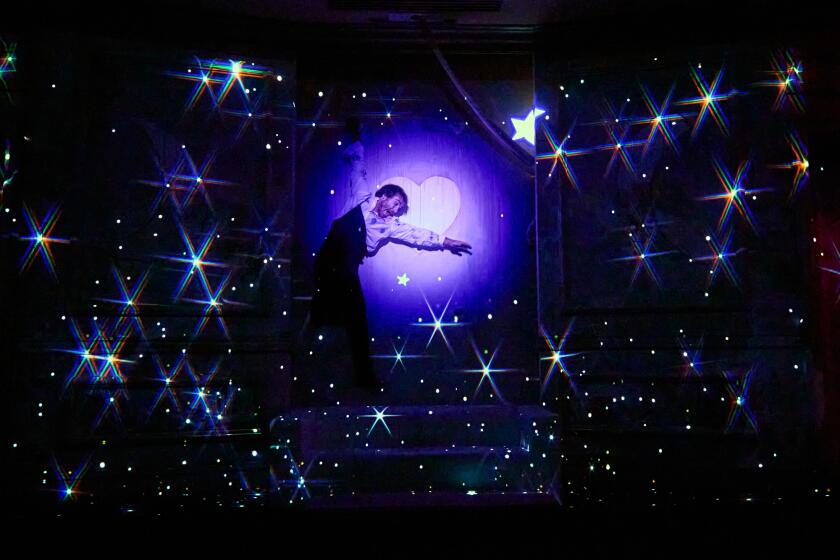MUSIC REVIEW : ALL-BERNSTEIN CONCERT AT THE CENTER
With his fingers flying over the keyboard, pianist Lukas Foss ignited the flashy jazz rhythms and syncopations of Leonard Bernstein’s Symphony No. 2, “Age of Anxiety,” Wednesday night at the Orange County Performing Arts Center.
But otherwise the all-Bernstein program played by the Pacific Symphony under the direction of Keith Clark was a dull, disappointing affair, one to endure rather than savor or appreciate.
Clark seemed determined to prove that Bernstein was an abstract, characterless composer, writing in the manner of a 12-tone formalist.
Heart-on-sleeve-Bernstein? Astonishing.
Clark placed Foss’ myriad-colored pianism in a straitjacket of broad, unshaped phrasing, stretches of unsubtle dynamics and, worst of all, in an indifference to the drama detailed in the W. H. Auden poem that gave the piece its name and framework.
Bernstein provided program notes to outline the arduous search for faith traced in the poem and reflected in his symphony, though he later stated that specific knowledge of the Auden work was not necessary to appreciate the music. Something beyond the musical notes, therefore--a sense of desolation and conflict leading to a final perception of grace--seems desirable. But little of that came across in Clark’s interpretation.
Bernstein’s Third Symphony, “Kaddish,” appears to represent the personal faith that the composer found. Unfortunately, Bernstein articulates that faith through a series of increasingly egoistical and embarrassingly direct speeches to God the Father, with whom the composer proposes to reach a new covenant.
Sadly, the composer’s musical invention generally seems to unravel here as well, and it was not helped much by Clark’s dry, percussive approach, which suggested that maybe the audience could be beaten into submission if not into understanding and appreciation.
Nonetheless, Michael Wager narrated the passages of Bernstein’s ambitious, modern-man’s theodicy with generally understated aplomb. Soprano Evelyn de la Rosa traversed the composer’s round trip from lullaby to anxiety and back again with attractively pale, woody tone.
The Pacific Chorale, singing the magnificent Hebrew verses from the Kaddish service, created mighty or wispy waves of sound as necessary, though by evening’s fugal end, the general crudeness in musical attack had gotten to the singers, too. The Pasadena Boys Choir piped with frail innocence.
The orchestra, which reverted to a more traditional floor plan after the use of risers on opening night, played with crisp precision in terminations and splotchy, spreading tone elsewhere.
Clark opened the concert with a hectic, driven account of the overture to “Candide.”
More to Read
The biggest entertainment stories
Get our big stories about Hollywood, film, television, music, arts, culture and more right in your inbox as soon as they publish.
You may occasionally receive promotional content from the Los Angeles Times.






